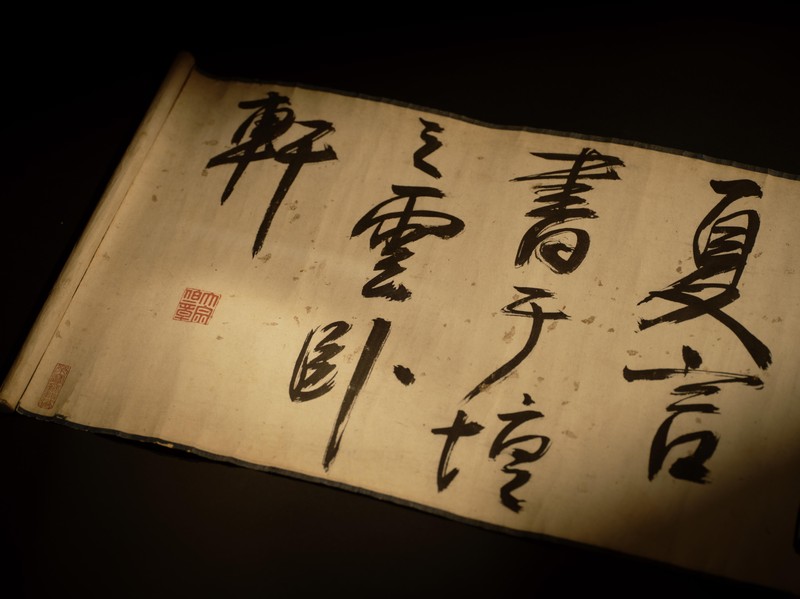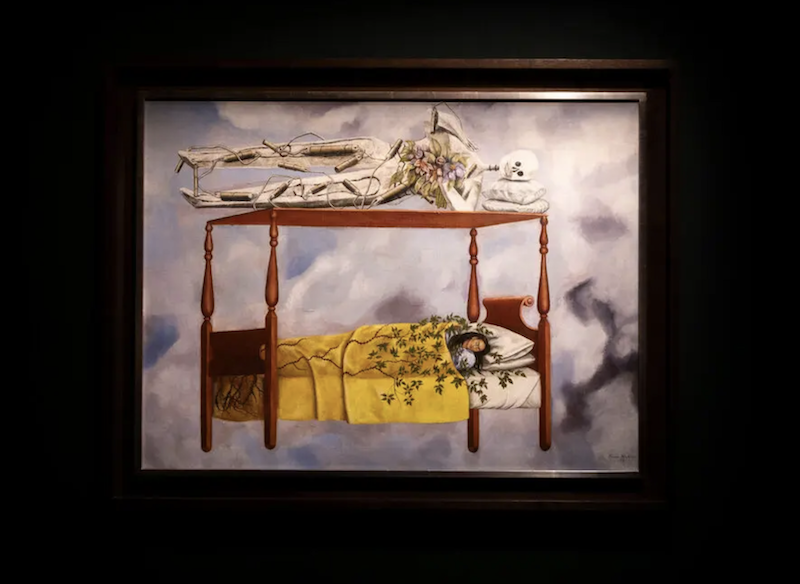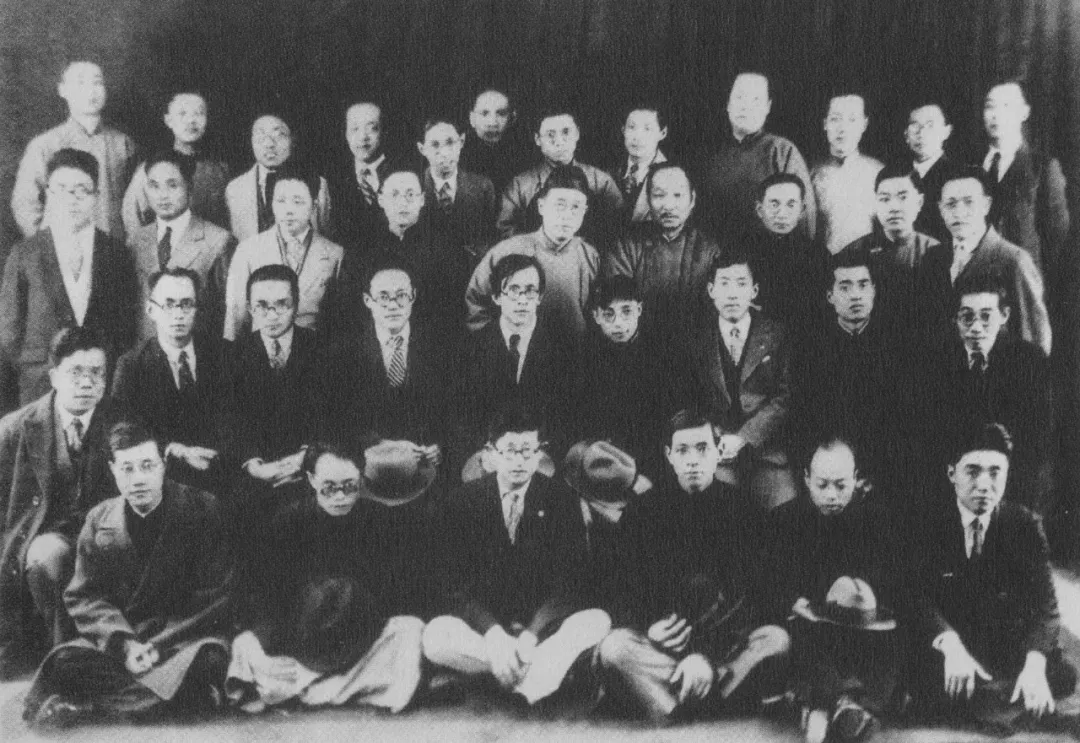
Founded in Shanghai in 1926, Kaiming Bookstore started with the Zhang brothers and later gained the support of grassroots intellectuals from the May Fourth Movement, such as Xia Mianzun and Ye Shengtao. It rose from a "brothers' bookstore" to become one of the five major publishing institutions in the Republic of China.
The Paper learned that a batch of items from the "Kaiming Bookstore" will be on display for the first time at the "Four Phases Collection" auction at the 2025 China Guardian Autumn Auction on November 24. All of these items were acquired by the descendants of Mr. Xu Diaofu , a core member of the Kaiming Bookstore's compilation department. The collection includes calligraphy, paintings, and letters from dozens of cultural figures such as Feng Zikai, Hongyi, Guo Moruo, Ye Shengtao, and Zhu Ziqing. These items record the daily lives of the bookstore colleagues as they collaborated on book compilation and faced national crises together. They also preserve heartwarming moments such as the poetry gathering of Mr. and Mrs. Xia Mianzun on their "wool wedding anniversary." The words reveal the spirit of the Kaiming people who value human relationships and uphold integrity, making it a unique window into the history of modern publishing and the interactions among literary figures.
This collection of documents and paintings unfolds like a scroll depicting the interactions between intellectuals, focusing on the spiritual exchange and historical imprints of the Kaiming Bookstore and its surrounding intellectual community. Using calligraphy and painting as a bond, it connects the mutual understanding and encouragement among these intellectuals amidst the chaos of war. With the Kaiming Bookstore as their base, through editing, publishing, art, and correspondence, they not only witnessed the ups and downs of individual destinies but also reflected the spiritual steadfastness and human warmth of modern Chinese intellectuals amidst profound changes.

A group photo of some editors, shareholders, and authors of Kaiming Bookstore in 1935. Front row, first from left: Zhang Xichen; Second row, fourth from left: Ba Jin, Wang Tongzhao, Gu Junzheng; Third row, fifth from left: Shu Xincheng, Xia Mianzun, Lin Yutang; Fourth row, first from left: Ye Shengtao, Xu Tiaofu, Qian Juntao, Hu Yuzhi, Mao Dun.
Kaiming Bookstore and Xu Diaofu
Xu Diaofu (1900-1982), also known as Mingji, pen name Pushao, was born in Zhapu, Pinghu City, Jiaxing, Zhejiang Province. He worked at the Commercial Press in his early years, and in May 1927, he transferred to the Kaiming Bookstore to head the publishing department. During this time, he commissioned and published many novels by authors such as Mao Dun, Ba Jin, and Xia Yan. During the War of Resistance against Japan, the Kaiming Bookstore suffered severe damage, and Diaofu worked to reprint modern literary classics, children's books, and English books, striving to restore the publishing business. After the victory of the War of Resistance, he contacted writers to solicit manuscripts, publishing *Xia Wei's Drama Collection* and *Wu Zuguang's Drama Collection*, and also collected and edited *Zhu Ziqing's Collected Works*. After the liberation, Xu Diaofu moved to Beijing with the Kaiming Bookstore, which later merged into the China Youth Publishing House. He then transferred to the Ancient Books Publishing House, and later to the Zhonghua Book Company as the head of the literature group. He joined the Communist Party of China in September 1956. During a special period, Xu Diaofu's family was forced to move to Jiangyou, Sichuan. In 1972, entrusted by Zhang Shizhao, he was responsible for the publication of Zhang's monumental academic work, *A Guide to Liu Zongyuan's Writings*, and his outstanding work was praised by Premier Zhou Enlai. In his later years, Tiao Fu compiled and published his essays, "Lectures on Famous Chinese Literary Works," which had been published in the magazine *Middle School Students*. Also published was *A Catalogue of Extant Yuan Dynasty Zaju Plays*.
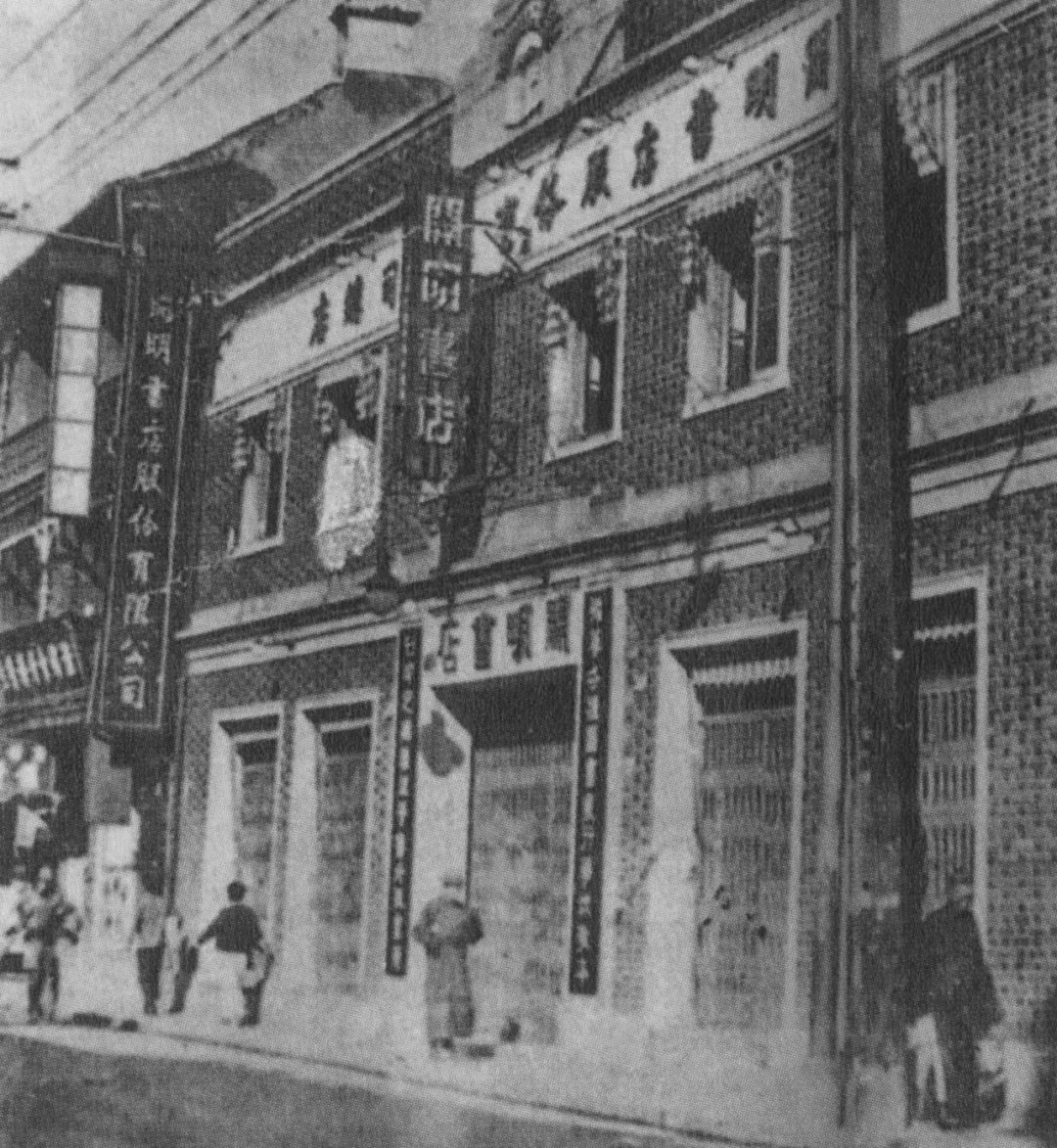
Kaiming Bookstore Main Store
In modern Chinese publishing, there's a saying: "Shang, Zhong, Shi, Da, Kai." These five characters represent five powerful publishing companies. "Shang" refers to the Commercial Press, founded in 1897, whose establishment coincided with the rise of the old democratic revolution. "Zhong," "Shi," and "Da" refer to the Zhonghua Book Company (founded in 1912), the Dadong Book Company (founded in 1916), and the World Book Company (founded in 1917), all established after the Xinhai Revolution. While bookstores under the guidance of the New Culture Movement sprang up like mushrooms after the May Fourth Movement, only Kaiming Book Company, starting with new-style magazines and supported by grassroots intellectuals from the May Fourth Movement, truly flourished and ultimately stood alongside the Commercial Press, Zhonghua Book Company, World Book Company, and Dadong Book Company, reshaping the landscape of the Republic of China's publishing industry.
In late 1925, due to ideological differences with his superiors, Zhang Xichen, editor-in-chief of *Women's Magazine*, was dismissed by the Commercial Press and founded *New Woman* magazine. This magazine was the predecessor of Kaiming Bookstore. On August 1, 1926, Kaiming Bookstore officially opened at No. 60 Baoshan Lane, Baoshan Road, Shanghai. Zhang Xichen served as general manager, and soon his brother Zhang Xishan came from Tianjin to Shanghai to assist his brother in running the bookstore. Initially, the Zhang brothers were fully responsible for all affairs of Kaiming Bookstore. At this time, Kaiming Bookstore was a veritable "brotherly privately run" bookstore. Although it also printed publications for progressive organizations such as the Literary Research Society, the Lida Society, and the Kuangbiao Society, and had a stable source of income like *Kaiming Loose-leaf Anthology*, in terms of scale, Kaiming Bookstore was still in its infancy and not much different from the numerous "new book industry" publishing companies across the country at that time. The real change came when a group of intellectuals from the May Fourth New Culture Movement, represented by Xia Mianzun and Ye Shengtao, joined the Kaiming Compilation and Translation Institute. Only then did Kaiming Bookstore gradually grow and eventually achieve its industry status as "the world's leading commercial bookstore."
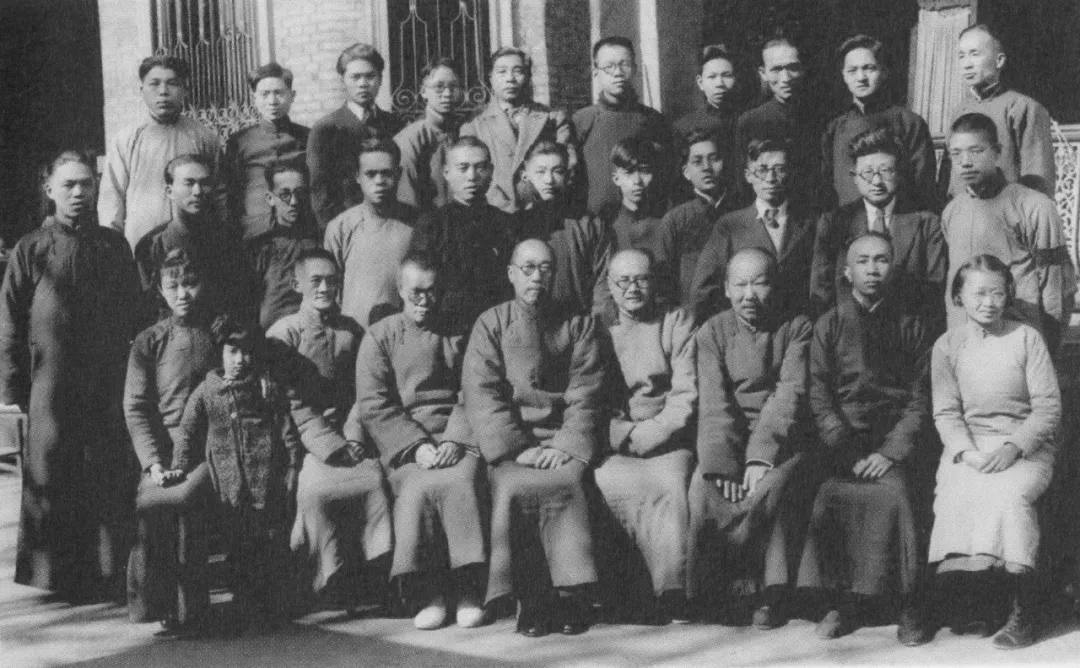
A group photo of colleagues from Kaiming Bookstore in 1941. From left to right in the front row, the third to seventh people are Xu Diaofu, Zhang Xichen, Fan Xiren, Wang Boxiang, and Xia Mianzun.
In late 1927, Xia Mianzun, who had been in charge of the magazine *Yiban*, succeeded Zhao Jingshen at Kaiming Bookstore, taking charge of the Kaiming Compilation and Translation Bureau. Following this, Ye Shengtao, Lü Shuxiang, Wang Boxiang, Gu Junzheng, Fu Binran, Song Yunbin, and Xu Diaofu successively joined Kaiming. These new intellectuals from the May Fourth Movement shared common characteristics: most came from Jiangsu and Zhejiang provinces, and many had teacher-student relationships with each other; many were also related by marriage, either directly or indirectly. More importantly, most of these "May Fourth generation" intellectuals who joined Kaiming's Compilation and Translation Bureau had not received a complete university education or had studied abroad; the vast majority had only received a secondary level of education. In other words, although they were May Fourth generation intellectuals, the main stratum of the "Kaiming intellectuals" belonged to the grassroots intellectuals of the May Fourth Movement. This composition of identity directly determined Kaiming's subsequent publishing direction.
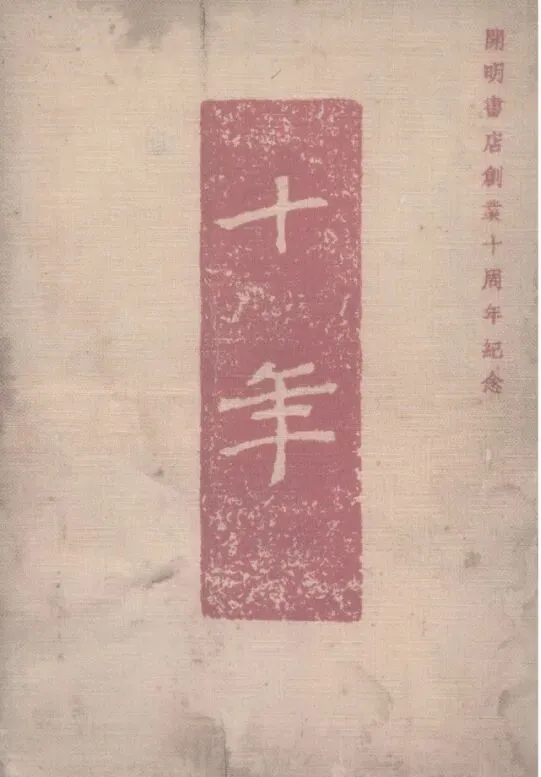
Kaiming Bookstore published its tenth anniversary commemorative collection, "Ten Years," in 1936.
It can be said that the Kaiming Bookstore began with the successive influx of "enlightened intellectuals" into its operations. The translation team, led by Xia Mianzun and Ye Shengtao, oversaw the bookstore's publishing direction, while the management team, headed by Zhang Xichen and Zhang Xishan, was responsible for its various operations. This close collaboration between the two teams transformed the Kaiming Bookstore from a "sister bookstore" into a comprehensive publishing house specializing in textbooks, ancient texts, and modern literature, ultimately making it a renowned member of the "Shangzhong Shida Kaiming" (a prominent name in the Republican-era book industry) group.
The "Kaiming Bookstore" memorabilia collection is roughly divided into two parts. One part consists of letters exchanged between Xu Diaofu and his colleagues and friends at Kaiming Bookstore, as well as calligraphy and paintings he received as gifts. The other part features poems and essays composed by "Kaiming people" to celebrate the 40th wedding anniversary of Xia Mianzun, the "head" of the Compilation and Translation Bureau, and his wife Jin Jia. Handwritten works by Kaiming Bookstore colleagues such as Zhang Xichen, Xia Mianzun, Feng Zikai, Ye Shengtao, Wang Boxiang, and Gu Junzheng, as well as friends such as Master Hongyi, Zhu Ziqing, Bing Xin, Guo Moruo, Shen Congwen, and Zhu Guangqian, are also on display. While this collection cannot fully recount the 28-year history of Kaiming Bookstore, it offers a glimpse into the refined style and demeanor of the "Kaiming people" of yesteryear.
Feng Zikai: One of the early supporters
Feng Zikai had a deep connection with Kaiming Bookstore. He was one of the early supporters of Kaiming Bookstore, investing 500 yuan as a shareholder when it was reorganized into a joint-stock company in 1929. In 1941, when the Kaiming Bookstore's compilation office established a branch in Chengdu, Feng Zikai was one of the editorial board members. Several important publications during Kaiming Bookstore's growth, such as the *Kaiming English Reader* and the *Kaiming Chinese Textbook*, were illustrated by Feng Zikai himself. Furthermore, Feng Zikai's own works, including comic book collections (such as *Protecting Life Drawings*, *The True Story of Ah Q in Comics*, and *The Complete Works of Zikai's Comics*), essays (such as *Essays from Yuanyuantang*), translations (such as *First Love*), and art theory works (such as *Introduction to Music*, *History of Western Art*, *A Tour of Famous Western Paintings*, and *Kaiming Lectures on Illustration*), were all successively printed and published by Kaiming Bookstore. It can be said that Feng Zikai's earliest collections of paintings, essays, and translations were all published by Kaiming Bookstore, and his most frequently reprinted book, "Introduction to Music," was also published by Kaiming.
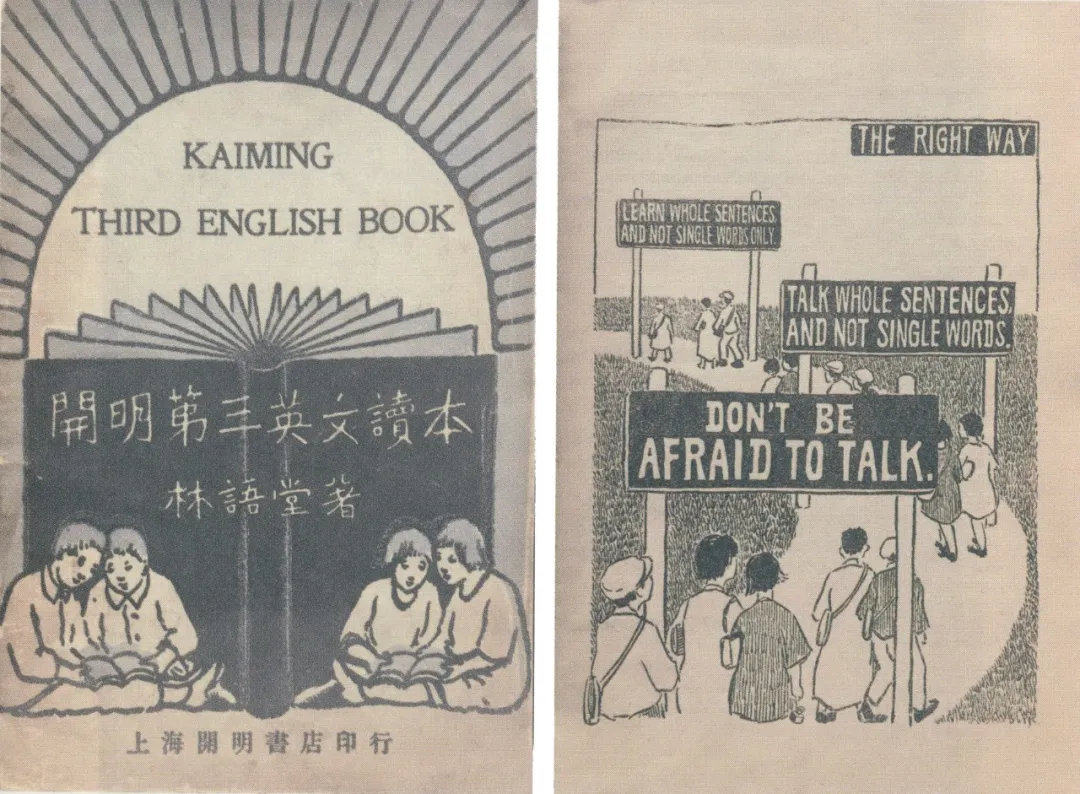
Cover and interior pages of "Kaiming Third English Reader" written by Lin Yutang and illustrated by Feng Zikai, published by Kaiming Bookstore in 1929.
Meanwhile, Feng Zikai was also the art editor and contributor to *Middle School Students* magazine, one of the "faces" of Kaiming Bookstore. Zhang Xichen, the founder of Kaiming Bookstore, was a close friend of Feng Zikai, and Xia Mianzun, the head of the Kaiming Bookstore's translation department, was Feng Zikai's teacher. Even the Kaiming Bookstore's logo was designed by Feng Zikai himself. Until 1953, Feng Zikai maintained close ties with Kaiming Bookstore for over twenty years.
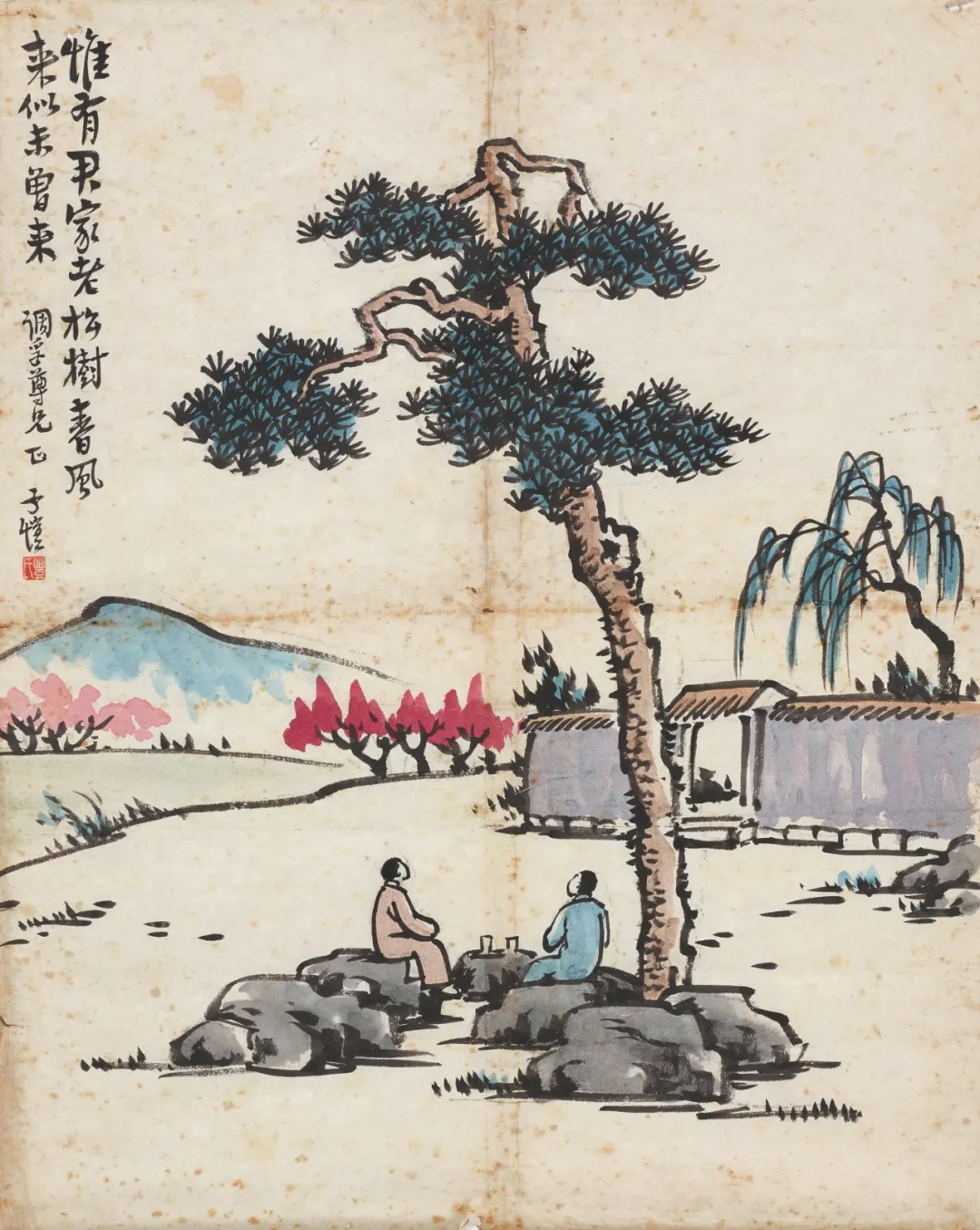
Feng Zikai (1898-1975) Spring Breeze Comes as If It Never Came Ink and color on paper, framed, 43×34.5 cm Inscription: Only your old pine tree, spring breeze comes as if it never came. Respectfully presented to my esteemed elder brother Tiaofu. Zikai.
As a senior editor who joined Kaiming Bookstore in 1927, Xu Diaofu was responsible for the bookstore's manuscript solicitation, editing, publishing and advertising for a long time. As a result, he had a long and close collaboration with Feng Zikai. This painting, "Spring Breeze Comes as If It Has Never Come," painted by Feng Zikai for Xu Diaofu, is a testament to their friendship over the years.
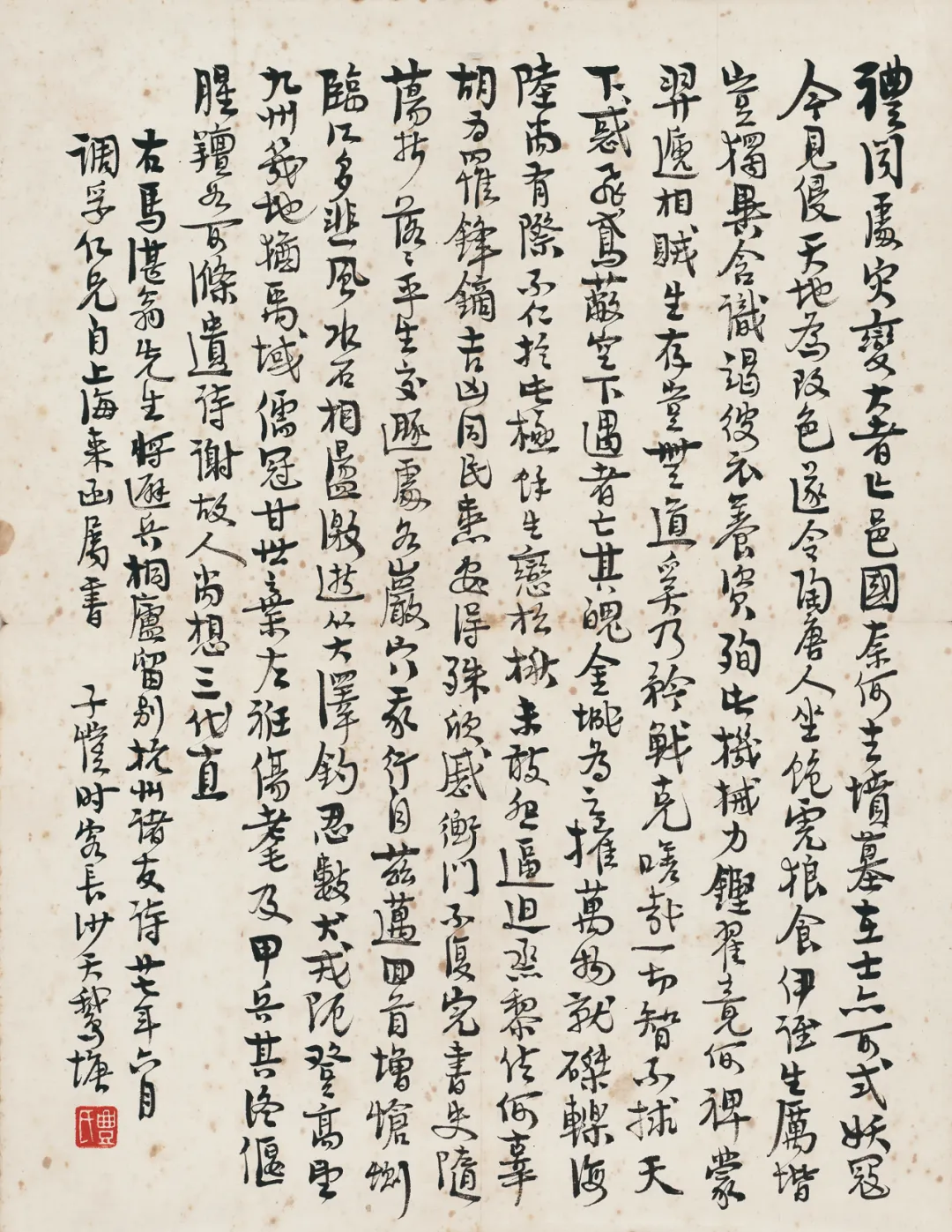
Feng Zikai's running script calligraphy of Ma Yifu's "Farewell to Friends in Hangzhou at Tonglu, Seeking Refuge from the Army," ink on paper, framed, 1938, 34.5×26.5 cm.
After the outbreak of the War of Resistance against Japan, the Japanese invaders' arrogance reached all the way to Hangzhou. Ma Yifu, who lived in a humble alley and associated with ancient scholars, was forced to seek refuge in Tonglu in October 1937, and then moved to Kaihua in December. "Farewell to Friends in Hangzhou Before Seeking Refuge in Tonglu" was written in September 1937, before Ma Yifu's departure to avoid the war. The entire poem closely reflects the current situation, with a mournful and hurried tone, heavy with etiquette, and read with meticulous care. Amidst the increasingly difficult situation, Feng Zikai's residence in Shimenwan was bombed by the Japanese invaders on November 6, 1937. In mid-November, Feng was forced to bid farewell to Yuanyuantang. Zikai himself said, "Just when I was at my wit's end and the artillery fire was approaching, I suddenly received a letter from Mr. Ma Zhanweng," in which he said that he had moved from Hangzhou to Tonglu to avoid the war, and inquired about the current situation in Shimenwan, whether he could settle down safely, and attached a mimeographed version of his recent five-character ancient poem, "Farewell to Friends in Hangzhou Before Seeking Refuge in Tonglu." Feng Zikai highly praised this poem, which greatly encouraged him. He said, "This letter and this poem brought a fragrant atmosphere to the dying Shimen Bay, dispelling the sulfurous, explosive, fierce, and murderous odors. For months, I had been suffocating and waiting to die without being able to breathe spiritual air, and now I can finally take a big breath."
Meanwhile, Kaiming Bookstore also suffered severe losses under Japanese artillery fire, with 80% of the publishing house's assets destroyed. A group of "Kaiming people," led by Xia Mianzun, Wang Boxiang, and Xu Diaofu, chose to stay in Shanghai, the "isolated island," to streamline operations and manage with difficulty. This painting is a letter Feng received from Xu Diaofu, who was holding the line in isolation, which he then presented to him in running script with a poem by Zhan Weng as encouragement.
Master Hongyi: Memories of his interactions with "enlightened intellectuals"
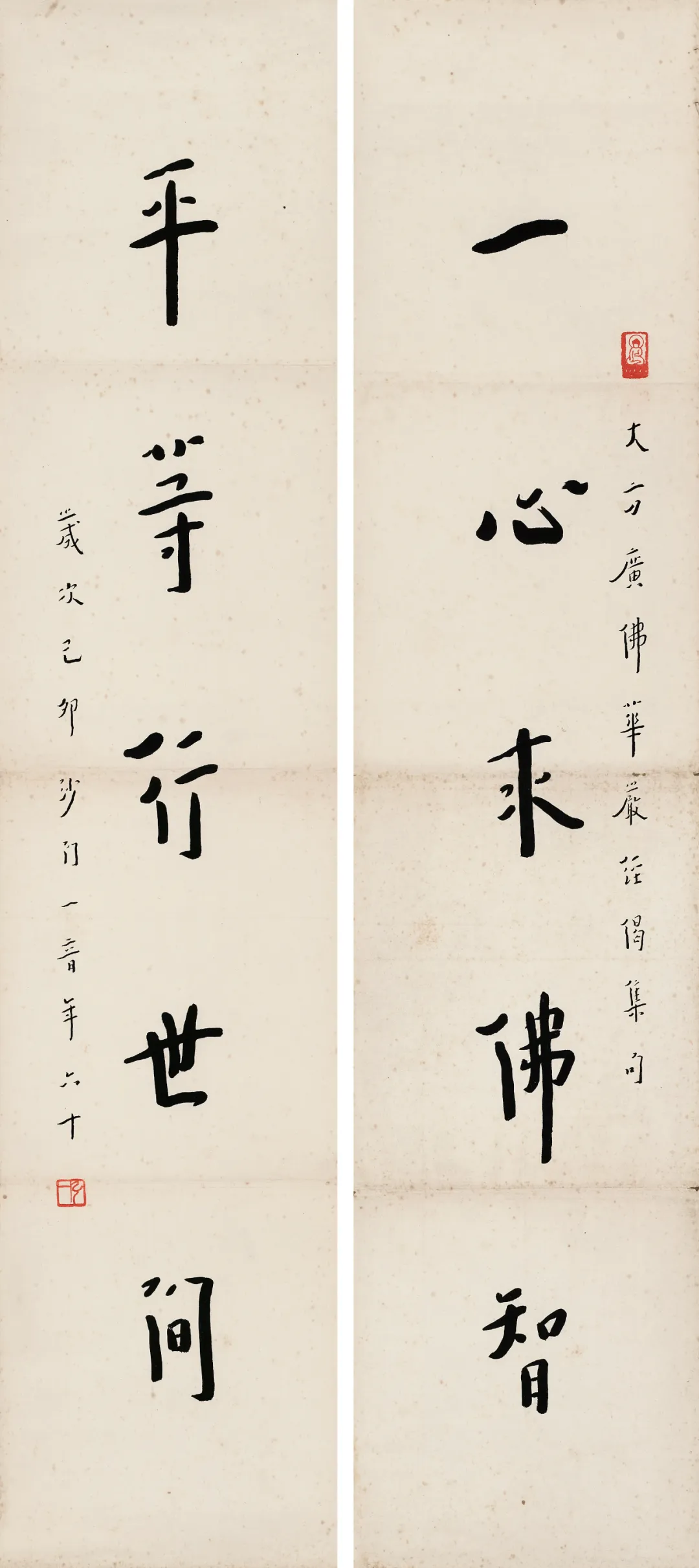
Hongyi (1880-1942) Five-character couplet in running script, ink on paper, painted in 1939, 80×17.5 cm (each): Seeking the wisdom of Buddha with a single mind, practicing equality in the world.
Master Hongyi had a long-standing connection with Kaiming Bookstore. Xia Mianzun, the head of the Kaiming Compilation and Translation Bureau, once said, "Master Hongyi had a special affinity with Kaiming Bookstore. Almost every letter he sent me was read by our colleagues. When he sent me a letter that resonated with us, it was always from our Kaiming colleagues first. So when he sent me a letter, not only did I like it, but everyone was happy." Besides Xia Mianzun, Feng Zikai, who had close ties with the intellectuals of the "Kaiming Bookstore faction," was also a close friend of Master Hongyi. Feng Zikai was Master Hongyi's student, and both were key members of the "White Horse Lake Writers Group." They spent a lot of time with Master Hongyi, had a deep understanding of him, and were profoundly influenced by him. It was precisely because of this relationship that Master Hongyi maintained close cooperation and connections with Kaiming Bookstore and the "Kaiming people." For example, in 1903, Master Hongyi's translations of "An Introduction to Jurisprudence" and "Private International Law," his collaborative work with Feng Zikai "The Collection of Paintings on Protecting Life," and his Buddhist music collection "The Collection of Cool Songs" were all published by Kaiming Bookstore. Another example is the important ancient book "Citong," published by Kaiming Bookstore. Xu Diaofu facilitated the process, and after approval by Zhang Xichen and Xia Mianzun, it was finally officially published in 1934. The title page of this book was personally inscribed by Master Hongyi.
This five-character couplet, obtained from the descendants of Xu Diaofu, was written by Master Hongyi using verses from the Avatamsaka Sutra. It is full of Master Hongyi's understanding of Buddhist principles and the world's sentient beings, and also a record of Master Hongyi's more than ten years of interaction with the "enlightened intellectuals" group.
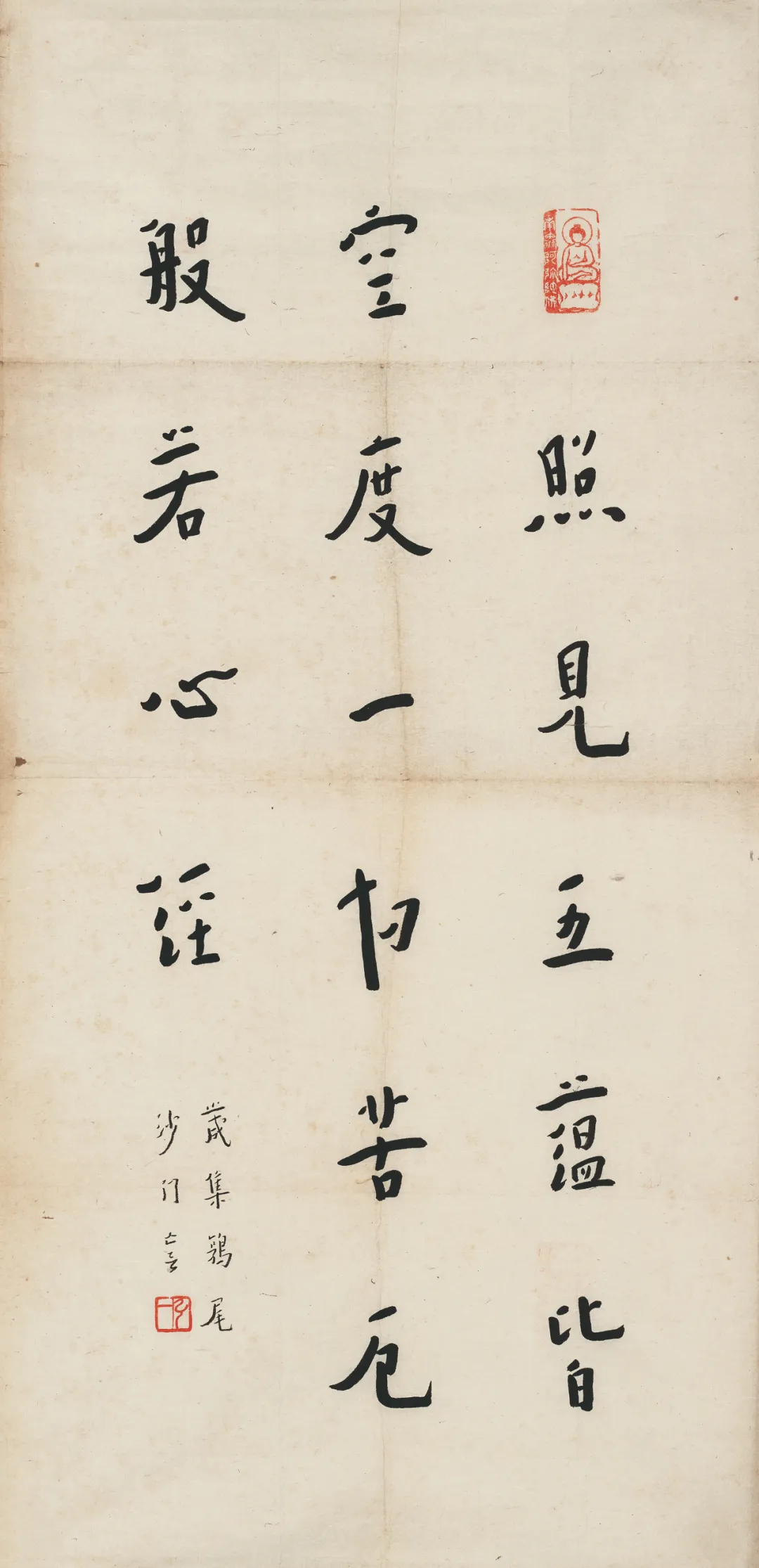
Hongyi, Heart Sutra in Running Script, Ink on Paper, Mirror Frame, 1942, 64×30.5 cm
The writings of literary masters
Kaiming Bookstore places great emphasis on its literary business. During its 28 years of operation, over 100 writers signed contracts with Kaiming Bookstore to publish their works. Guo Moruo, Shen Congwen, Bing Xin… these prominent names in literary history continue to influence generations of young writers.

Guo Moruo (1892-1978), Cursive Script of "West River Moon", Ink on Paper, 63×17.5 cm. Inscription: A shepherd boy and a water buffalo are talking. Tune: West River Moon. Respectfully presented to Mr. Tiaofu, Guo Moruo.
"I am fully clothed in a straw raincoat, while you are without any armor. Stones are flying and sand is flying ahead, so hurry home! My skin is like iron, and my courage is boundless. I have been tempered since ancient times and I will not slacken. I fear neither wind nor rain!"
This image contains a poem by Guo Moruo inscribed on Li Keran's painting "Returning Home in Wind and Rain." The original poems were two separate poems, "The Shepherd Boy" and "The Water Buffalo," written on August 22, 1942, in Jingangpo, a western suburb of Chongqing. The "Chronological Biography of Guo Moruo" indicates that the poem was "published in the April 1946 issue 2 of the monthly magazine *Wenxuan*." However, some sources suggest it was published even earlier in 1945 in the supplement *Yuanye* of the *Shenzhou Daily*. When the poem was republished in the *Yishi Bao* in September 1947, the original line "boundless capacity in the heart" was changed to "boundless courage in the heart." Unlike the main publication *Shenzhou Daily*, the editor of the supplement *Yuanye*, Zhao Qingge, adhered to "liberalism," making it a relatively free space for expression at the time. Lao She, Zang Kejia, Xie Bingying, Xiong Foxi, Yao Xueyin, and Guo Moruo all published numerous literary works in this publication.

Shen Congwen (1902-1988), Cursive Script of Wu Yuanheng's "Mountain Dwelling", Ink on Paper, Hanging Scroll, 131×32 cm
“I lean against the springs and ravines, turning my back on the world; I enter the misty vines and find deep sanctuary. I know nothing of city affairs all year round; the bamboo groves I planted by my own hands provide ample shade.” Shen Congwen’s inscription on Wu Yuanheng’s “Mountain Dwelling” in cursive script reads: “Respectfully instructing my brother Tiaofu. Your younger brother Congwen in his humble study.”
Shen Congwen's works published by Kaiming Publishing House include "Border Town," "The Long River," "Moonlit Scenes," and "Travels in Hunan," among others. He particularly valued the Kaiming edition of his "Collected Works" published in the 1940s. Shen Congwen's relationship with the Kaiming editors began as a result and continued into the 1950s.
In her memoir, "My Connection with Kaiming," Bing Xin recalls that her association with Kaiming Bookstore began around 1932. Bing Xin and Kaiming Bookstore collaborated closely; for example, her work "On Women," written during her Chongqing period, was ultimately reprinted by Kaiming Bookstore through Ba Jin's connections. In fact, during Kaiming Bookstore's more than twenty-year history, Bing Xin's "Past Events" was reprinted 18 times, second only to the works of Ba Jin and Mao Dun, demonstrating the depth of Bing Xin's relationship with Kaiming.
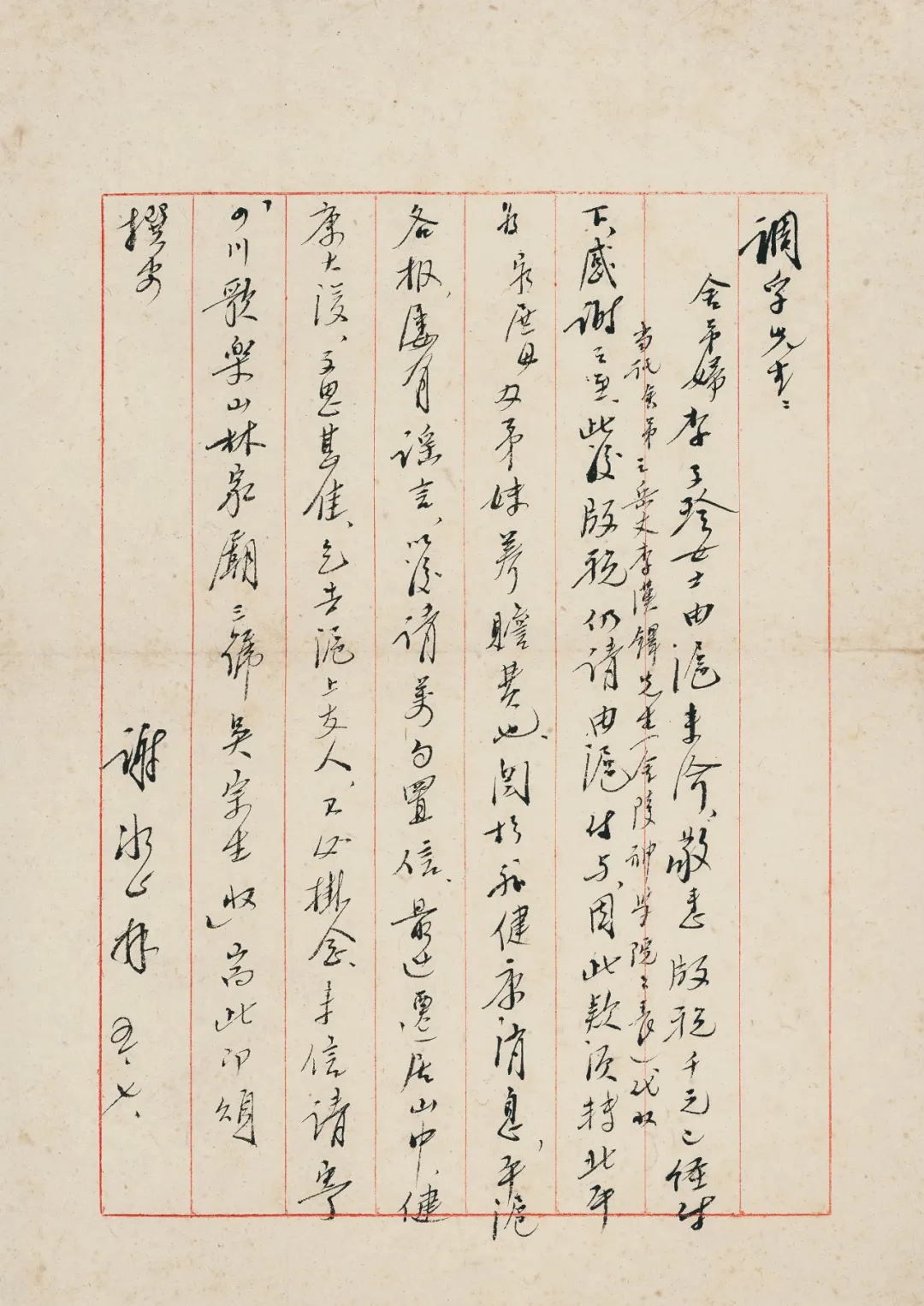
A letter from Bing Xin (1900-1999) to Xu Diaofu regarding "royalties," a framed scroll, ink on paper, one page.
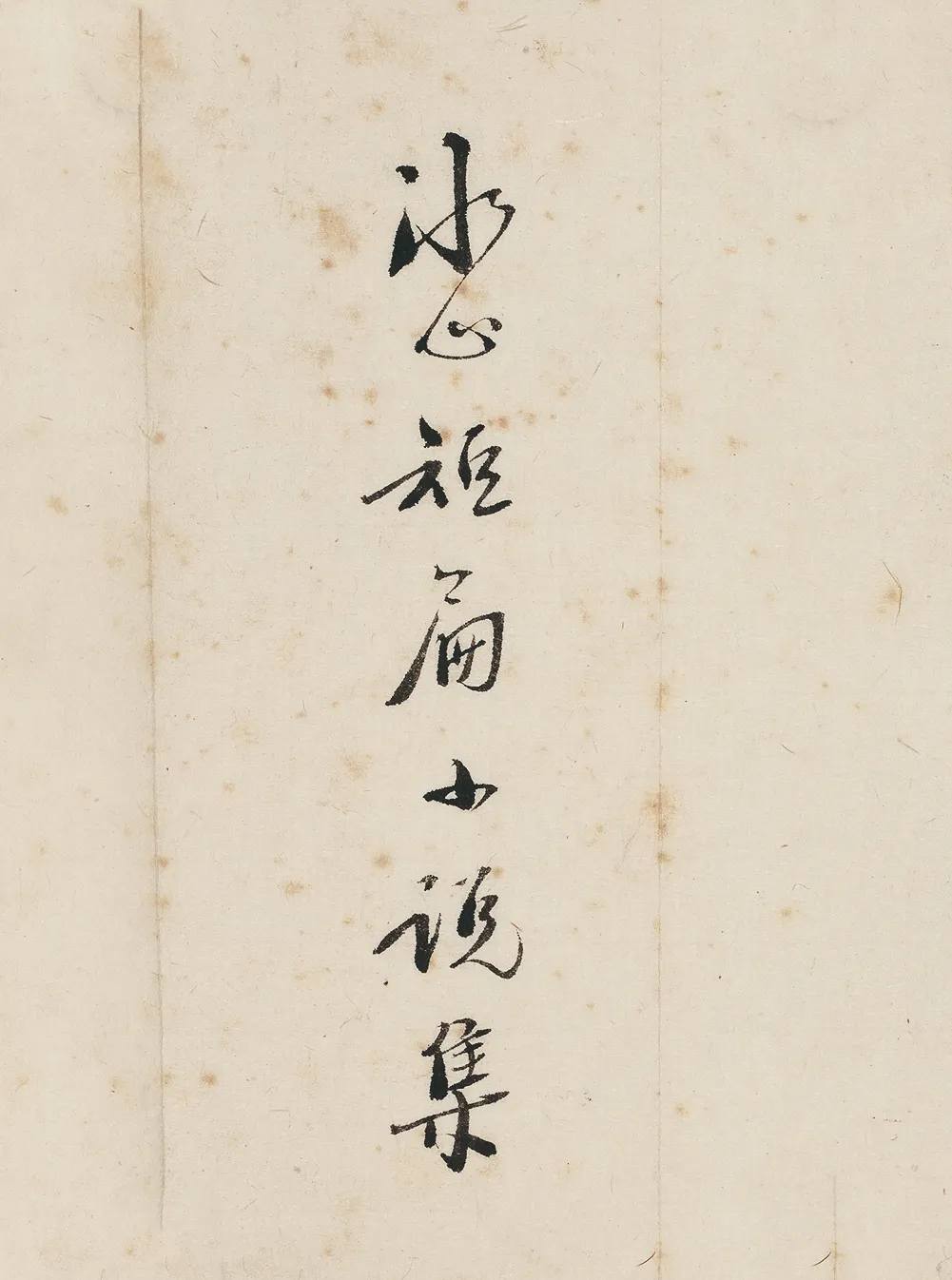
Attached is a sheet of Bing Xin's handwritten "Bing Xin's Short Stories Collection".
On November 23, 1940, Bing Xin and her family moved from Yunnan to Chongqing, temporarily residing at No. 5 Jialu, Qixinggang. In February 1941, they moved to No. 19 Chunsen Road, and later to No. 3 Linjiamiao, Gele Mountain, also known as "Qianlu". In this letter, Bing Xin specifically wrote "recently moved to the mountains" and noted "please send letters to Wu Zongsheng, No. 3 Linjiamiao, Gele Mountain, Sichuan". Based on the date at the end of the letter, it can be inferred that this letter was written on May 7, 1941. The content is as follows:
Mr. Tiaofu: My younger brother's wife, Ms. Li Zizhen, has come to Chongqing from Shanghai. I am deeply grateful to have received the 1,000 yuan in royalties. (I have entrusted Mr. Li Handuo, my brother's father-in-law and the "President of Jinling Theological Seminary," to receive it on her behalf.) Please continue to pay royalties from Shanghai, as this money needs to be transferred to Beiping for the support of my stepmother and siblings. Regarding my health, there have been many rumors in the newspapers of both Shanghai and Beijing; please do not believe them in the future. I recently moved to the mountains, and my health has greatly improved, and my writing is excellent. Please tell my friends in Shanghai not to worry. Please send your letters to Wu Zongsheng, No. 3 Linjiamiao, Gele Mountain, Sichuan. Best regards. Xie Bingxin. May 7th.
Ye Shengtao's Letters: Recording Deep Friendship
A series of letters written by Mr. Ye Shengtao to his close friend Xu Diaofu in the 1970s and 80s transcend ordinary private correspondence. These letters represent a profound dialogue between a literary giant and his old friend in his later years, exploring life, friendship, memory, and the times. They record the deep affection and spiritual world of two cultural elders amidst turbulent times. The letters include snapshots of the era when Beijing residents were homeless after the 1976 earthquake, as well as deep remembrance of deceased friends (especially Zhu Ziqing) and historical research. In greetings about daily life, informing his old friend of his current situation, and offering comfort in the face of loss, Ye Shengtao reveals his deep concern for his friend. The letters also overflow with endless reminiscence of their shared past and the poignant sentiment of "the letter is short, but the feelings are long," vividly showcasing the sincere friendship and nostalgia of a generation of intellectuals who had experienced the vicissitudes of life in their later years.
In a letter written after the 1976 earthquake, Ye Shengtao first reassured his friends that he was safe and then described in detail the scene of Beijing residents setting up tents in their courtyards to sleep in and avoid aftershocks, saying that "tents stretched as far as the eye could see, creating a magnificent sight," which became a true snapshot of the social landscape during that special period.
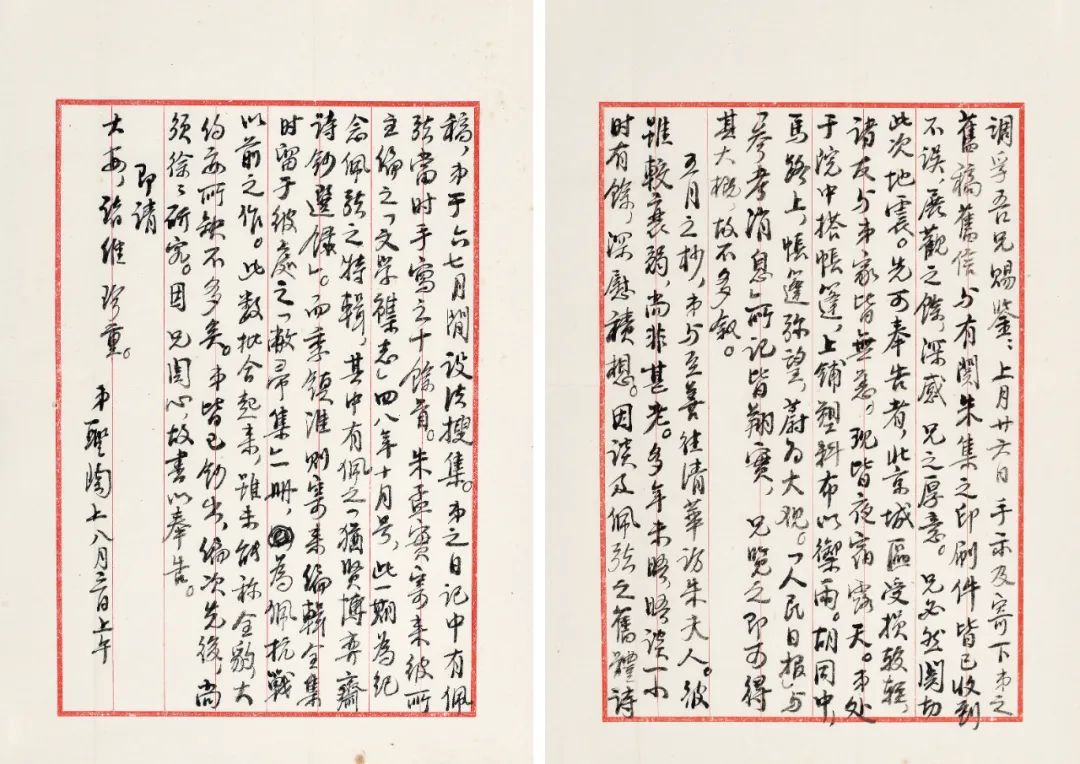
Ye Shengtao (1894-1988) Letter to Xu Diaofu after the earthquake, ink on paper, framed, two pages, painted in 1976, 25.5×17.5 cm (each).
Dear Brother Tiaofu, I have received your old manuscripts, letters, and printed copies of Zhu Ji's collection that you sent me on the 26th of last month. I am deeply grateful for your kindness. I know you are concerned about the earthquake. I can inform you that the damage in Beijing was relatively minor, and all my friends and my family are unharmed. We are currently sleeping outdoors. I have set up a tent in my yard, covered with a plastic sheet for rain protection. The tents are a common sight in the alleys and on the streets. The reports in the *People's Daily* and *Reference News* are detailed, and you can easily grasp the gist of it, so I will not elaborate further. At the end of May, Zhishan and I visited Madam Zhu at Tsinghua University. Although she was somewhat frail, she was not very old. We hadn't seen each other for many years, and our conversation lasted for over an hour, which greatly comforted me. We discussed Pei Xian's old-style poems, which I managed to collect in June and July. My diary contains more than ten poems handwritten by Pei Xian at that time. Zhu Mengshi sent me the October 1948 issue of *Literary Magazine*, which he edits. This issue was a special edition commemorating Pei Xian, and included Pei Xian's *Selected Poems from Youxian Boyi Studio*. Ji Zhenhuai sent me a copy of *The Humble Collection*, which had been circulating there while he was editing the complete works; these were Pei Xian's works before the War of Resistance. These batches, though not complete, contain roughly what is missing. I have copied them all, and the order of their arrangement still requires careful study. I am writing this to inform you of your concern. Best wishes for your well-being. Your younger brother, Shengtao, August 3rd, morning.
The following letter is filled with deep longing for the late Zhu Ziqing (Peixian). Ye Shengtao not only repeatedly discussed and created the poem "Lanling Wang" in memory of Zhu Ziqing with his friend, but also meticulously recorded the process of collecting and organizing Zhu Ziqing's old-style poems from various sources. His sincerity is deeply moving. The letter chronologically connects their interactions in Hangzhou, Beijing, Europe, and Chengdu, outlining their decades-long friendship.
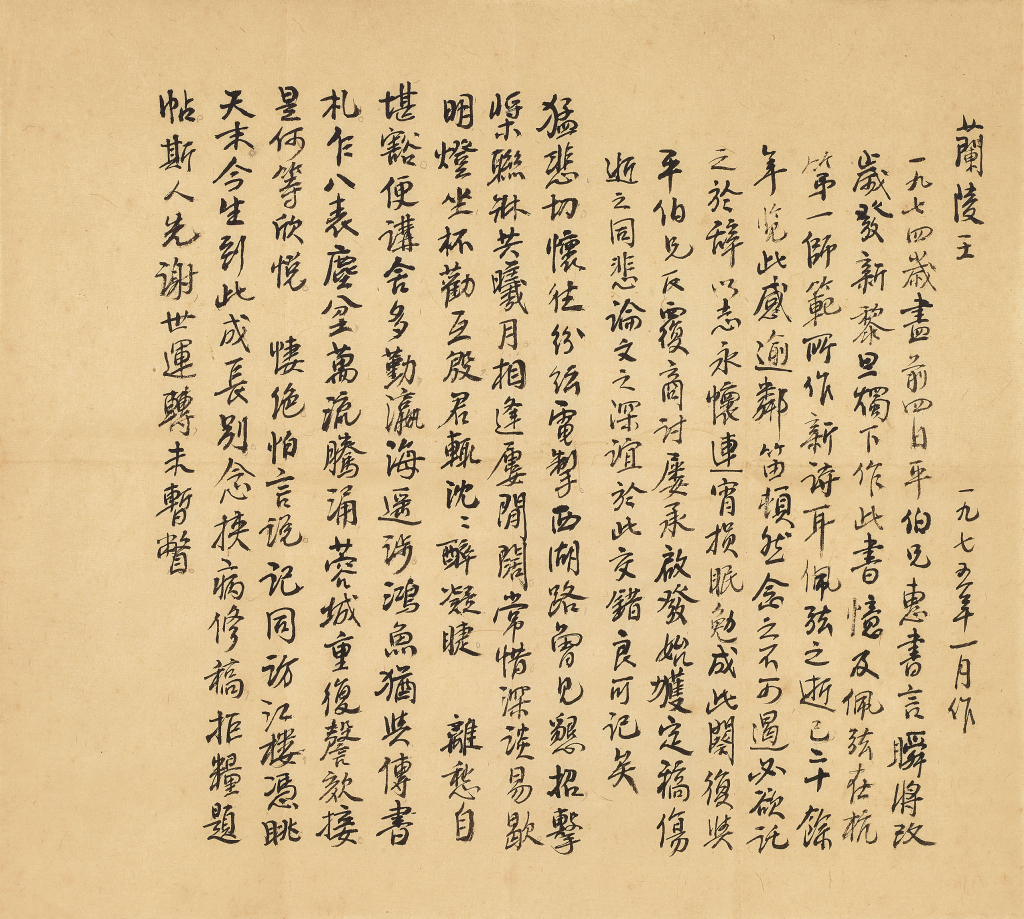
Ye Shengtao's handwritten letter in remembrance of Zhu Ziqing's "Prince of Lanling"
Lanling Wang. Written in January 1975. A sudden, intense sorrow, memories flashing like lightning. West Lake Road, where I once earnestly invited you, we rowed boats together, sharing the sun and moon. We met often in quiet moments, always regretting that our deep conversations were so easily cut short. Under the bright lamp, we sat drinking, exchanging toasts, you always deeply intoxicated, your lashes lingering. The sorrow of parting was easily dispelled, and you diligently studied, even traveling across the vast ocean, your letters carried by geese. Suddenly, the dust settles on the eight directions, ten thousand streams surge. Chengdu echoes with your calls, what joy! So poignant, I dare not speak of it. I remember visiting the river tower together, gazing at the horizon. Now, in this life, we part ways. I recall working on this manuscript while ill, refusing food to write this letter. This person has passed away first, the world turns, not even a fleeting glimpse.
The frequent mentions of each other's recent situations in some letters are a testament to their deep friendship. Ye Shengtao repeatedly recalled the years they worked together at the Commercial Press and Kaiming Bookstore, and even lived under the same roof, expressing his gratitude that "the letter is short but the feelings are long," and his longing to talk face-to-face again. The letters also included details of their daily lives, such as exchanging photos, discussing the publication of their collected works, and explaining the origins of old letters, revealing their affection.

Human kindness is truly wonderful; I have a deep connection with it. Everything else can be given up, but human kindness is hard to relinquish. March 3, 1957. Sheng Tao.
Forty years we shared the same fate, this parting is now without end. You will forever go your own way, while I will bear the remaining years alone. Leaving home, I am filled with sorrow; entering the room, I linger. These memories are not a dream, yet I still hope for the day I awaken. March 3, 1957, Sheng Tao.
Mountains verdant and shoulder to shoulder, lake shimmering and reflecting, my first travels took place in Hangzhou. Sorrowful are the sounds of the river and the fires on the shore, a poignant farewell to Tongzhou. Accustomed to coming and going, the Songbo River flows thirty-six miles, leaning against the window of my boat, just arrived in Suzhou. Suddenly, the dust of war weighs on my old age, a westward journey to Chongqing. Crimson cliffs and green peaks, we climbed together, a joyful sight in Jiaxing. Again, I bought a boat to return home, resting from the wind and rain, heading east to Kuizhou. I happily praise the new destiny of this old land, heading south and then north to Qingzhou. Sitting in the winter sun on the southern mountain, my destiny remains in Hangzhou. In a brief recount of my travels with Mo in Yangzhou, my sorrow is boundless. —Sheng Tao
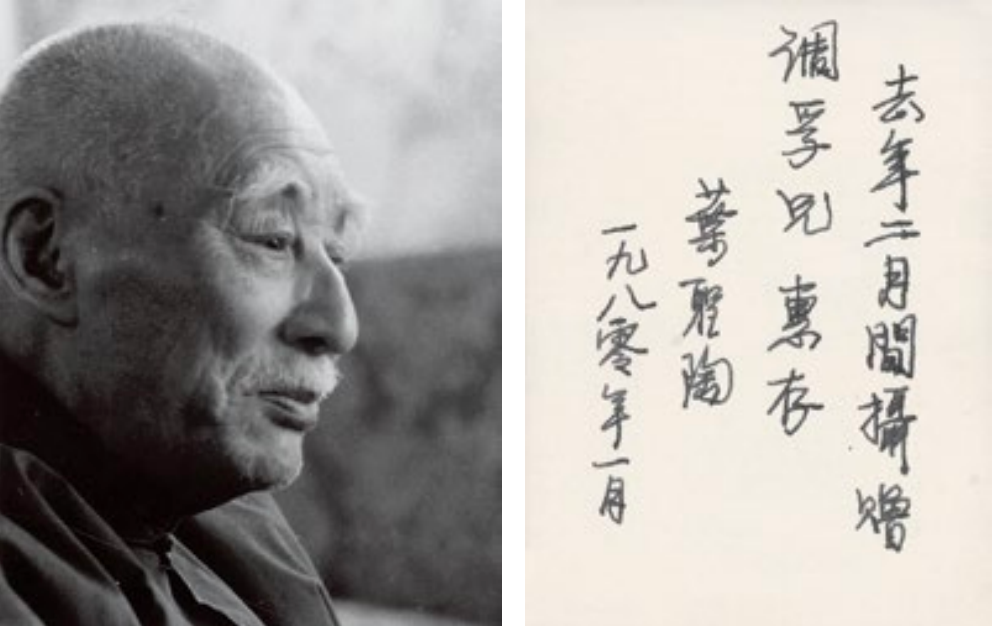
Photographed last February. Presented to my friend Tiaofu for safekeeping. Ye Shengtao, January 1980.
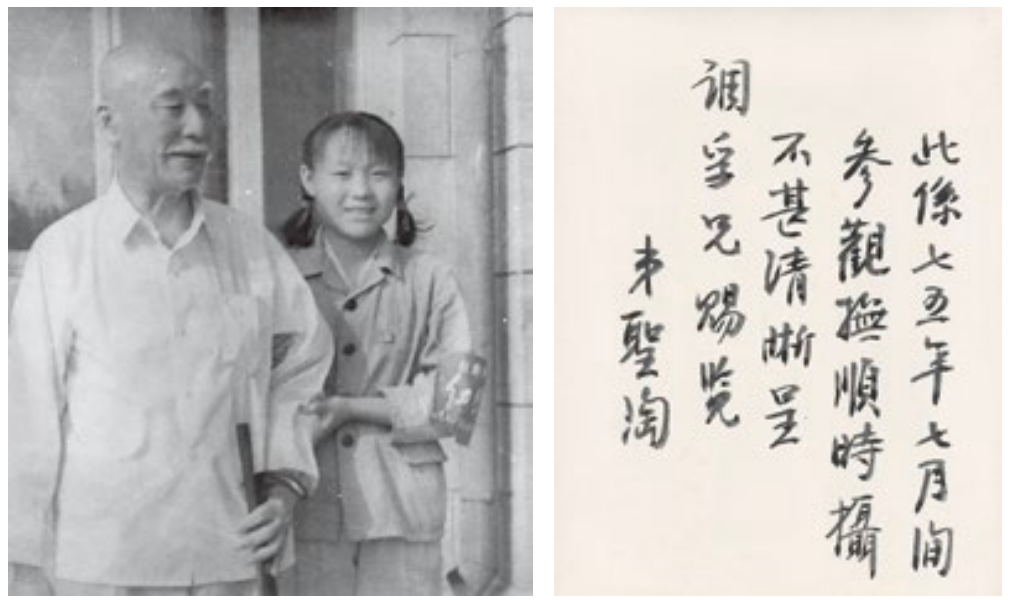
This photo was taken during a visit to Fushun in July 1975. It is not very clear, but I present it to my brother Tiaofu for his perusal. Your younger brother, Ye Shengtao.
The following are three letters from Ye Shengtao to Xu Tiaofu, totaling three pages.

(I) To my esteemed brother Tiaofu: Zhishan has returned and recounted the details of our visit. I am deeply pleased to learn of your pleasant stay in Shanghai. Among our old friends, Yunbin and Binran are of rather poor mental health, unlike you and me, who possess such clear-headedness. I was delighted to receive your recent photograph; you look as youthful as ever, showing no signs of decline. I have no recent photos at my place, but I am sending you two from a few years ago, which I am fortunate to have preserved. Junzheng is still in the hospital, but his respiratory condition is no longer in danger. He will return home once the weather warms up. My life is as usual; I spend my days leisurely reading or writing. Respectfully yours, Shengtao, March 22nd.

(II) To my dear brother Tiaofu: I received your kind letter yesterday. Your words were elegant and gentle, and I was deeply pleased to read them, as if you were speaking to me personally. I also found the letter from Hong Kong that you sent me back, which brought back memories from over twenty years ago. Indeed, as you have said, the pronouns used in that letter are now rarely known by most. In your letter, you mentioned that when I was living in Suzhou, you and Mianweng visited me, intending to discuss a certain matter, but ultimately did not. The past is of no consequence, but knowing it is enough to evoke nostalgia. I humbly request that in your next letter you briefly mention the event, so that I may know today why you and Mianweng visited Suzhou forty years ago. Wouldn't that be a mutual pleasure? In your letter, you described Mianweng's innocent and naive nature as if he were still alive. Therefore, not only do I wish to know this, but Zhishan and Manzi would also be very eager to hear it. With haste, I reply. Respectfully yours, Shengtao, April 28th, morning.

(III) To my dear brother Tiaofu: Yunzhuang and Manzi spoke on the phone recently, saying that you visited me on the afternoon of the 18th, but no one answered the door when I knocked, and even when I called your uncle's house, no one answered. I was home alone that day, taking a nap with the door closed, and thus missed this precious meeting. I apologize for this. I only hope that I will have the time to visit again someday. We have not seen each other for several years, and there is so much to talk about; even a whole day's conversation would not be too long. I heard that you have come to Beijing again to publish Zhang Weng's book, and I imagine you will stay for several months. I had previously thought that if you could lend me a proof copy so I could have a general idea of it, I would be very pleased. I wonder if this will come to fruition? Respectfully yours, Ye Shengtao, April 20th, afternoon.
Congratulatory letters from friends including Zhu Ziqing to Xia Mianzun and his wife on their 40th wedding anniversary.
January 21, 1943, marked the 40th wedding anniversary of Mr. Xia Mianzun and his wife, Ms. Jin Jia, a day known as their "wool wedding anniversary." At that time, Shanghai was still an "isolated island" under Japanese occupation, and the situation was extremely difficult.
Mr. Zhang Xichen (Xuecun), the founder of Kaiming Bookstore, specially initiated and organized this commemorative event. He invited six couples, totaling twelve people, including his friends Wang Boxiang, Xu Tiaofu, Gu Junzheng, and Suo Fei, to a simple yet warm family banquet at the Xia family home. Mr. Zhang Xichen first composed four seven-character quatrains to celebrate, and Mr. Xia Mianzun gladly responded with a poem in the same rhyme scheme, entitled "A Poem in Response to the Wool Wedding Anniversary." Xia Mianzun's close friends, such as Ye Shengtao, Zhu Ziqing, Zhu Guangqian, and Wang Tongzhao, though separated by war, also sent poems in response to the event, offering their congratulations from afar. These poems are not merely simple exchanges, but also a testament to the mutual comfort, unwavering integrity, and deep friendship among scholars and intellectuals during the War of Resistance against Japan.
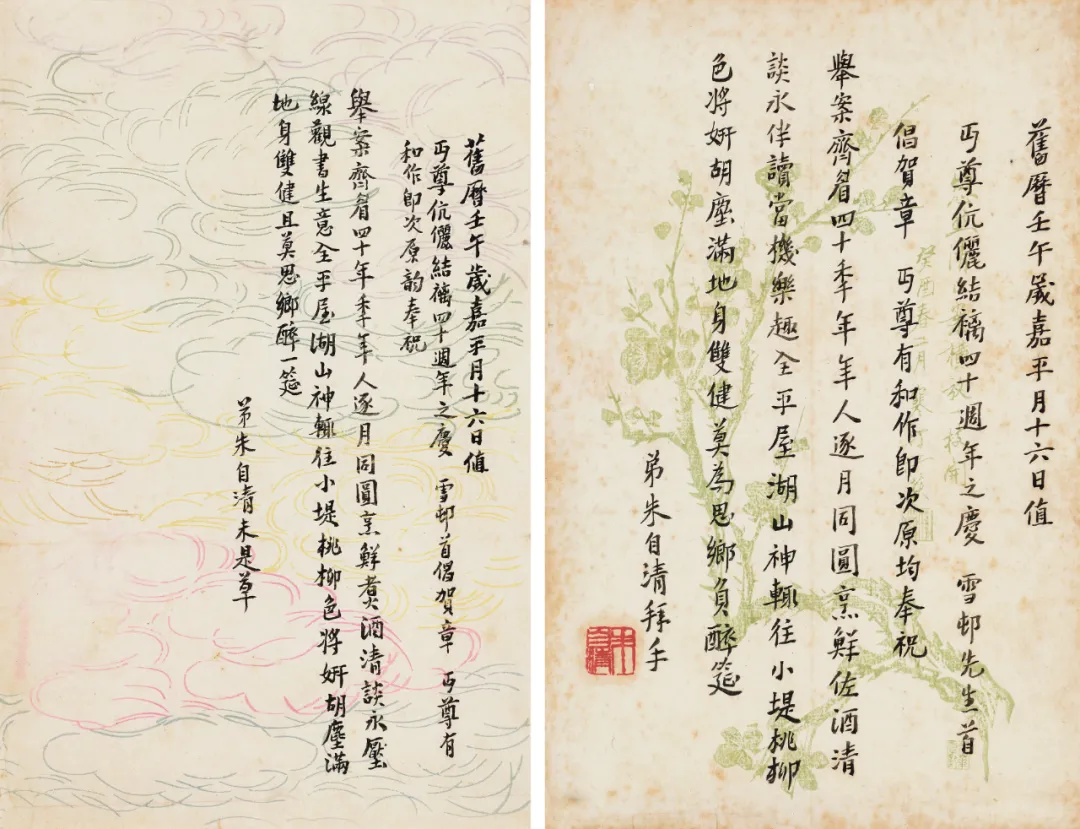
Zhu Ziqing (1898-1948) wrote a poem in the style of a regulated verse to celebrate the 40th wedding anniversary of Xia Mianzun and Jin Jia, along with a first draft on one page. The poem is displayed in a frame and is two pages in ink on paper.
In his congratulatory message, Zhu Ziqing wrote: "On the sixteenth day of the tenth month of the Renwu year of the lunar calendar, on the occasion of the fortieth anniversary of the marriage of Mr. and Mrs. Mianzun, Xuecun first proposed a congratulatory poem, and Mr. Mianzun responded with a poem in response. I will now offer my congratulations in the same rhyme."
The congratulatory message consists of two pages, written on Wuyun paper and Jiang Hanting’s specially made floral paper, respectively. The content of the two papers is slightly different, and the format is also slightly different. Judging from the signature and content, the Wuyun paper is the first draft, while the Jiang paper is the final draft.
As a close friend of Kaiming Bookstore, Zhu Ziqing not only contributed articles to Kaiming for a long time, but also had his important works, such as "The Back View," "European Travel Notes," and "London Notes," printed and published by Kaiming Bookstore. He had a deep and extensive network of friends with his colleagues at Kaiming. More notably, as one of the four chief editors of "The Complete Works of Wen Yiduo," which was officially published by Kaiming Bookstore in 1948, Zhu Ziqing not only undertook extensive preliminary work on drafting the table of contents and reviewing manuscripts, but also remained concerned about the publication of the complete works until the very end of his life. Unfortunately, Mr. Zhu passed away a month before the official publication of the complete works, a great loss and regret.

Ye Shengtao (1894-1988) wrote a seven-character poem in ink on paper to celebrate the 40th wedding anniversary of Xia Mianzun and Jin Jia. (Scroll painting, ink on paper, one page)
Ye Shengtao wrote the following poem in seven-character quatrains to celebrate the 40th anniversary of the marriage of Xia Mianzun and Jin Jia: "No poems have dispelled my melancholy for a year, so I pick up my pen to wish you a happy reunion. I remotely contemplate the joy of two cups, and in my drunken recitation of four verses, I see your spirit fully revealed. Looking towards our homeland, spring is approaching, and our love as an elderly couple grows ever more beautiful. This sentiment is shared and comforting, and I eagerly anticipate the day of our joyous reunion." The poem is signed "Submitted by Ye Shaojun. Residing in Chengdu at the time."
Xia Mianzun and Ye Shengtao were not only colleagues who worked together for many years, but also close friends. On June 4, 1939, Xia Mianzun's daughter, Xia Manzi, and Ye Shengtao's son, Ye Zhishan, held their wedding in Leshan, Sichuan. Therefore, Ye Shengtao referred to Xia Mianzun as "Mianweng, the in-law" in this photo.
This piece is written on Five-Cloud Paper, which features auspicious five-colored cloud patterns, symbolizing good fortune and carrying auspicious wishes. Five-Cloud Paper is a representative work of Rongbaozhai's traditional woodblock printing technique, whose production process began in the Qing Dynasty and continues to this day. In 1935, Rongbaozhai systematically organized traditional paper art for the first time in the form of "Beiping Paper Album," and Five-Cloud Paper was widely included due to its diverse themes and exquisite printing.
Link to [Auction Information]
China Guardian Autumn Auction "Four Phases Collection"
Location: Guardian Art Center (No. 1 Wangfujing Street), B1 Floor, Hall A
Preview Dates: November 19-21 (Open to the public)
Guardian Customer Day, November 22
Auction time: November 24th, Lot 2901-3069, 9:30 AM
